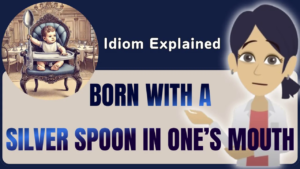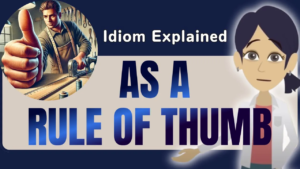Have you ever been trapped in a debate about whether 10:00 or 10:01 is the “correct” meeting time? That’s hair-splitting in action.
To make unnecessarily fine distinctions or focus on trivial details during an argument or discussion.
Idioms can be puzzling when taken literally, yet mastering them is essential for natural communication.

The expression “split hairs” perfectly captures those moments when someone obsesses over minute details that hardly matter in the bigger picture.
Let’s explore this common idiom’s origins, practical usage, and how to recognize when you or others might be guilty of this often frustrating habit.
Split Hairs Meaning
To “split hairs” means to focus on minor or insignificant details in an argument or discussion. This idiom captures the image of someone dissecting a single strand of hair to find differences that hardly matter.
People who split hairs may lose sight of the central issue by obsessing over small points. This habit can slow down decision-making, create tension, or cause unnecessary debates.
Sometimes, paying attention to detail is good. However, when such attention drags a conversation into trivial territory, it can become counterproductive.
History & Culture
The phrase “split hairs” dates back to the 1600s. Its vivid imagery of literally dividing a single strand of hair into multiple parts underscores an unnecessary focus on minutiae.
It has retained its popularity in English-speaking cultures, where efficiency and clarity are often prized. Over the centuries, people have found themselves rolling their eyes at needless debates, thus keeping this idiom alive and well.



In German, “Haarspalterei” conveys a similar meaning: splitting a hair in two as a metaphor for nitpicking.
One also finds a counterpart in French, often expressed as “couper les cheveux en quatre,” which literally translates to “cut hair into four.”
These examples show that many cultures share the idea of faulting people who argue over trivial differences.
It seems we all appreciate practicality over pedantic bickering.
Funny Daily Life Stories
Office Drama Moment
Picture a bustling office where a team debates whether a report is due at 5:00 PM or 5:01 PM. A colleague might exclaim, “Let’s not split hairs!” when they notice the debate is stuck on one minute.
In one humorous account, two coworkers wrestled with whether to start a meeting at precisely 10:00 AM or 10:01 AM.
When someone jokingly suggested using a stopwatch to enforce punctuality, everyone realized they were overreacting.
Coffee Clash at Work
In another memorable story, two partners at a law firm argued over the perfect brewing temperature for coffee.
One insisted on 200 degrees Fahrenheit, the other on 195.
A blind taste test proved that nobody could tell the difference. They chuckled at how they had been splitting hairs over five degrees, noting that their energy could be better spent on more pressing matters.
Dinner with Friends
Imagine inviting people to dinner at 7:00 PM. If someone complains and insists it should be 7:02 PM to align with a specific cooking timer, they might be accused of “splitting hairs.”
Little details can matter, but when the distinction adds no real value, it merely complicates the plan. Even a small debate can spiral into comedic territory.
Similar & Opposite
Here are some expressions closely related to “split hairs,” as well as their opposites. By understanding them, you will gain a richer vocabulary for describing trivial disagreements or broader oversights.
Similar Expressions
- Nitpick: To criticize or focus on small errors or unimportant details.
- “He tended to nitpick about punctuation, even in casual text messages.”
- “He tended to nitpick about punctuation, even in casual text messages.”
- Quibble: To argue over insignificant matters.
- “They quibbled for an hour about how to arrange the books on a shelf.”
- “They quibbled for an hour about how to arrange the books on a shelf.”
- Make a Mountain Out of a Molehill: To overstate a minor issue.
- “She made a mountain out of a molehill by panicking about a single typo in the draft.”
- “She made a mountain out of a molehill by panicking about a single typo in the draft.”
- Fuss: To show unnecessary concern about small aspects of something.
- “He fussed for ages over whether the cushions were straight on the sofa.”
- “He fussed for ages over whether the cushions were straight on the sofa.”
- Pedantic: Overly concerned with formal rules or tiny details.
- “Her pedantic approach to scheduling left everyone exhausted by the end of the meeting.”
Opposite Expressions
- Overlook: To fail to notice something, usually minor.
- “He overlooked the fact that he had missed a button on his shirt.”
- “He overlooked the fact that he had missed a button on his shirt.”
- Ignore: To pay no attention, sometimes intentionally.
- “She ignored the slight color difference in the plates, focusing on conversation instead.”
- “She ignored the slight color difference in the plates, focusing on conversation instead.”
- Simplify: To make a process or argument easier to understand.
- “They decided to simplify the proposal by removing less important data points.”
- “They decided to simplify the proposal by removing less important data points.”
- Generalize: To speak broadly without focusing on details.
- “He chose to generalize instead of elaborating on every minor rule in the manual.”
- “He chose to generalize instead of elaborating on every minor rule in the manual.”
- Neglect: To disregard properly, often leading to oversight.
- “When he neglected the exact measurements, the bookshelf turned out slightly uneven.”
Smart “Split Hairs” Tips
- Keep Perspective:
Always ask whether the detail you are debating truly affects the outcome. If not, move forward and let the small stuff go. - Use Humor:
A lighthearted joke can often defuse tension when people start splitting hairs. A quick comment such as, “We’re not solving the world’s biggest mystery here,” can steer the conversation back on track. - Stay Polite:
If someone else is splitting hairs, address it calmly. Gentle reminders like, “We might be overthinking this,” can help them refocus. - Establish Priorities:
Before a discussion starts, identify the main goal. This practice prevents minor disagreements from overshadowing important tasks. - Use Clear Language:
If you sense confusion, rephrase your statement without relying on idioms. Stating “I think we’re arguing over details that don’t change the final result” might be clearer for some audiences.
Pop Quiz: Check Your Idiom Skills
Split Hairs

Conclusion
“Split hairs” describes focusing too much on trivial details—something common in work, social, or family talks. Staying focused on what matters improves communication and avoids unnecessary tension.



Use the idiom, but not the habit! Step back when things get too precise and aim for clarity over perfection.
👉 Bookmark this post and share your take on this idiom in the comments!









Comment